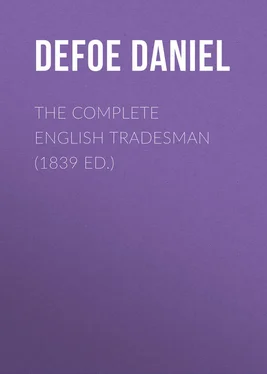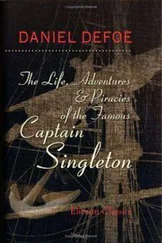Daniel Defoe - The Complete English Tradesman (1839 ed.)
Здесь есть возможность читать онлайн «Daniel Defoe - The Complete English Tradesman (1839 ed.)» — ознакомительный отрывок электронной книги совершенно бесплатно, а после прочтения отрывка купить полную версию. В некоторых случаях можно слушать аудио, скачать через торрент в формате fb2 и присутствует краткое содержание. Жанр: foreign_antique, foreign_prose, на английском языке. Описание произведения, (предисловие) а так же отзывы посетителей доступны на портале библиотеки ЛибКат.
- Название:The Complete English Tradesman (1839 ed.)
- Автор:
- Жанр:
- Год:неизвестен
- ISBN:нет данных
- Рейтинг книги:3 / 5. Голосов: 1
-
Избранное:Добавить в избранное
- Отзывы:
-
Ваша оценка:
- 60
- 1
- 2
- 3
- 4
- 5
The Complete English Tradesman (1839 ed.): краткое содержание, описание и аннотация
Предлагаем к чтению аннотацию, описание, краткое содержание или предисловие (зависит от того, что написал сам автор книги «The Complete English Tradesman (1839 ed.)»). Если вы не нашли необходимую информацию о книге — напишите в комментариях, мы постараемся отыскать её.
The Complete English Tradesman (1839 ed.) — читать онлайн ознакомительный отрывок
Ниже представлен текст книги, разбитый по страницам. Система сохранения места последней прочитанной страницы, позволяет с удобством читать онлайн бесплатно книгу «The Complete English Tradesman (1839 ed.)», без необходимости каждый раз заново искать на чём Вы остановились. Поставьте закладку, и сможете в любой момент перейти на страницу, на которой закончили чтение.
Интервал:
Закладка:
Besides, for want of judgment in the goods he is to buy, he often runs a hazard of being cheated to a very great degree, and perhaps some time or other a tradesman may be ruined by it, or at least ruin his reputation.
When I lived abroad, I had once a commission sent me from a merchant in London, to buy a large parcel of brandy: the goods were something out of my way, having never bought any in that country before. However, it happened that I had frequently bought and imported brandies in England, and had some judgment in them, so much that I ventured to buy without taking a cooper with me, which was not usual in that place. The first parcel of brandy I saw was very good, and I bought freely to the value of about £600, and shipped them for England, where they gave very good satisfaction to my employer. But I could not complete my commission to my mind in that parcel. Some days after, some merchants, who had seen me buy the other, and thought me a novice in the business, and that I took no cooper to taste the brandy, laid a plot for me, which indeed was such a plot as I was not in the least aware of; and had not the little judgment which I had in the commodity prevented, I had been notoriously abused. The case was thus: – They gave me notice by the same person who helped me to the sight of the first brandy, that there was a cellar of extraordinary good brandy at such a place, and invited me to see it. Accordingly I went in an afternoon, and tasted the brandy, being a large parcel, amounting to about £460.
I liked the goods very well; but the merchant, as they called him, that is to say, the knave appointed to cheat the poor stranger, was cunningly out of the way, so that no bargain was to be made that night. But as I had said that I liked the brandy, the same person who brought me an account of them, comes to my lodgings to treat with me about the price. We did not make many words: I bade him the current price which I had bought for some days before, and after a few struggles for five crowns a-tun more, he came to my price, and his next word was to let me know the gage of the cask; and as I had seen the goods already, he thought there was nothing to do but to make a bargain, and order the goods to be delivered.
But young as I was, I was too old for that too; and told him, I could not tell positively how many I should take, but that I would come in the afternoon, and taste them again, and mark out what I wanted. He seemed uneasy at that, and pretended he had two merchants waiting to see them, and he could sell them immediately, and I might do him a prejudice if I made him wait and put them off, who perhaps might buy in the mean time.
I answered him coldly, I would not hinder him selling them by any means if he could have a better chapman, that I could not come sooner, and that I would not be obliged to take the whole parcel, nor would I buy any of them without tasting them again: he argued much to have me buy them, seeing, as he said, I had tasted them before, and liked them very well.
'I did so,' said I, 'but I love to have my palate confirm one day what it approved the day before.' 'Perhaps,' says he, 'you would have some other person's judgment of them, and you are welcome to do so, sir, with all my heart; send any body you please:' but still he urged for a bargain, when the person sent should make his report; and then he had his agents ready, I understood afterwards, to manage the persons I should send.
I answered him frankly, I had no great judgment, but that, such as it was, I ventured to trust to it; I thought I had honest men to deal with, and that I should bring nobody to taste them for me but myself.
This pleased him, and was what he secretly wished; and now, instead of desiring me to come immediately, he told me, that seeing I would not buy without seeing the goods again, and would not go just then, he could not be in the way in the afternoon, and so desired I would defer it till next morning, which I readily agreed to.
In the morning I went, but not so soon as I had appointed; upon which, when I came, he seemed offended, and said I had hindered him – that he could have sold the whole parcel, &c. I told him I could not have hindered him, for that I had told him he should not wait for me, but sell them to the first good customer he found. He told me he had indeed sold two or three casks, but he would not disoblige me so much as to sell the whole parcel before I came. This I mention, because he made it a kind of a bite upon me, that I should not be alarmed at seeing the casks displaced in the cellar.
When I came to taste the brandy, I began to be surprised. I saw the very same casks which I had touched with the marking-iron when I was there before, but I did not like the brandy by any means, but did not yet suspect the least foul play.
I went round the whole cellar, and I could not mark above three casks which I durst venture to buy; the rest apparently showed themselves to be mixed, at least I thought so. I marked out the three casks, and told him my palate had deceived me, that the rest of the brandy was not for my turn.
I saw the man surprised, and turn pale, and at first seemed to be very angry, that I should, as he called it, disparage the goods – that sure I did not understand brandy, and the like – and that I should have brought somebody with me that did understand it. I answered coldly, that if I ventured my money upon my own judgment, the hazard was not to the seller, but to the buyer, and nobody had to do with that; if I did not like his goods, another, whose judgment was better, might like them, and so there was no harm done: in a word, he would not let me have the three casks I had marked, unless I took more, and I would take no more – so we parted, but with no satisfaction on his side; and I afterwards came to hear that he had sat up all the night with his coopers, mixing spirits in every cask, whence he drew off a quantity of the right brandy, and corrupted it, concluding, that as I had no judgment to choose by but my own, I could not discover it; and it came out by his quarrelling with the person who brought me to him, for telling him I did not understand the goods, upon which presumption he ventured to spoil the whole parcel.
I give you this story as a just caution to a young tradesman, and to show how necessary it is that a tradesman should have judgment in the goods he buys, and how easily he may be imposed upon and abused, if he offers to buy upon his own judgment, when really it is defective. I could enlarge this article with many like examples, but I think this may suffice.
The next thing I recommend to an apprentice at the conclusion of his time, is to acquaint himself with his master's chapmen; 6 6 [Individuals dealt with.]
I mean of both kinds, as well those he sells to, as those he buys of, and, if he is a factor, with his master's employers. But what I aim at now is the chapmen and customers whom his master chiefly sells to. I need not explain myself not to mean by this the chance customers of a retailer's shop, for there can be no acquaintance, or very little, made with them; I mean the country shopkeepers, or others, who buy in parcels, and who buy to sell again, or export as merchants. If the young man comes from his master, and has formed no acquaintance or interest among the customers whom his master dealt with, he has, in short, slipt or lost one of the principal ends and reasons of his being an apprentice, in which he has spent seven years, and perhaps his friends given a considerable sum of money.
For a young man coming out of his time to have his shop or warehouse stocked with goods, and his customers all to seek, will make his beginning infinitely more difficult to him than it would otherwise be; and he not only has new customers to seek, but has their characters to seek also, and knows not who is good and who not, till he buys that knowledge by his experience, and perhaps sometimes pays too dear for it.
Читать дальшеИнтервал:
Закладка:
Похожие книги на «The Complete English Tradesman (1839 ed.)»
Представляем Вашему вниманию похожие книги на «The Complete English Tradesman (1839 ed.)» списком для выбора. Мы отобрали схожую по названию и смыслу литературу в надежде предоставить читателям больше вариантов отыскать новые, интересные, ещё непрочитанные произведения.
Обсуждение, отзывы о книге «The Complete English Tradesman (1839 ed.)» и просто собственные мнения читателей. Оставьте ваши комментарии, напишите, что Вы думаете о произведении, его смысле или главных героях. Укажите что конкретно понравилось, а что нет, и почему Вы так считаете.












